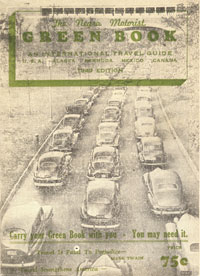Listening
exercise
NPR: 'Green Book' Helped African-Americans Travel Safely
Talk
of the Nation, September 15, 2010
Access
audio report from this page:
http://www.npr.org/templates/story/story.php?storyId=129885990
The questions
only cover the report until about the 8 minute point
| in
part Jim Crow era to be defined African-Americans towns and cities to be welcome on the road who knew restaurant hotel beauty shop night club to slam doors in people's faces guide to be published motorist to be updated decades printed cover civil rights leader Julian Bond memories to hear from to play a role to join the conversation web site NAACP Lincoln Theater introduction combination pamphlet to stop to eat to thumb through a book postal worker contacts postal worker's union various spots at its height to cover as well as Barbados to need s.t. badly primarily in the South segregation that's not the case |
|
to
exist Kansas City on display mimeographed copy archives to belong to Buck O'Neil I could imagine how... jazz musicians obviously patrons baseball players black communities in between Muskogee, Oklahoma negro leagues scout black college athletes to recruit major leagues barber shop bar roadside inn to take for granted to extend down to gas station advertisement ads obviously commerce direct marketing customers photo ads occasionally messages politicians communities entrepreneurial valuable resource Jewish printed to tend not to prevalent to blend in general population to carry their religion on their face |
Listening
comprehension questions:
1. When was the "Jim Crow" era in the US and what was it like for
African Americans during that period?
2. What minor mistake did the radio host, Neal Conan, make in introducing
his guest?
3. Why was the Green Book necessary, and so useful, for black people in the
US in the 1930s through the 1960s?
4. Where did the Green Book get its name?
5. In what parts of the US were black people discriminated against?
6. Where did Mr. Green get the information for updates for his book?
7. Who is Langston Hughes?
8. What state is Kansas City located in?
9. How did the Green book help — and also get some financial support
from — black businesses?
10. What other ethnic group mentioned in this broadcast had sometimes been
discriminated against by businesses and thus had a book similar to the Green
Book?
